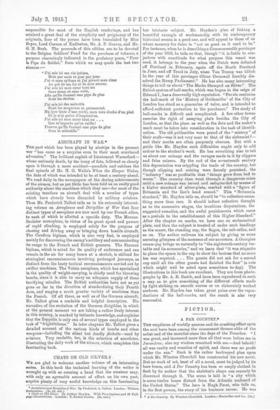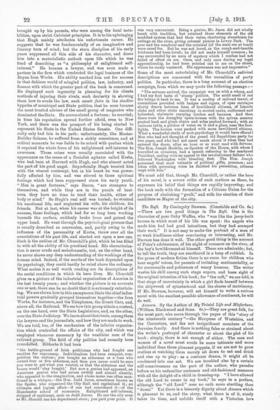FICTION.
A FAR COUNTRY.*
Tien emptiness of worldly success and its crushing effect upon the soul have been among the commonest themes alike of the artist and of the moralist since the days of the Preacher. " I was great, and increased more than all that were before me in Jerusalem; also my wisdom remained with me.—And behold ! all was vanity and vexation of spirit, and there was no profit under the sun." Such is the rather hackneyed plan upon which Mr. Winston Churchill has constructed his new novel. But no work of art, least of all a novel, must be judged by its bare bones, and A Far Country has been so amply clothed in flesh by its author that the skeleton's shape can scarcely be discerned through it. The scene is laid in a city which is some twelve hours distant from the Atlantic seaboard of the United States." The hero is Hugh Paret, who tells us, in the first person, the story of his business career. He was • A Fur Country. By Winston Churchill. London: Macmillan and Co.. [lie.]
brought up by his parents, who were among the local nota- bilities, upon strict Calvinist principles. It is to his upbringing that Hugh mainly attributes his unfortunate career. He suggests that he was fundamentally of an imaginative and literary turn of mind; but the stern discipline of his early years suppressed all this side of his character, and drove him into a materialistic outlook upon life which he was fond of describing as "a philosophy of enlightened self- interest." He became a lawyer, and was soon made a partner in the firm which conducted the legal business of the Boyne Iron Works. His ability marked him out for success in that dubious world of mingled politics, law, industry, and finance with which the greater part of the book is concerned. He displayed such ingenuity in planning for his clients
methods of injuring their rivals, such dexterity in showing them how to evade the law, such savoir fairs in the shadier bypaths of municipal and State polities, that he soon became the most trusted adviser of the small group of magnates who
dominated the State. He accumulated a fortune ; he married; in time his reputation spread further afield, even to New York, and there was the prospect of his being elected to represent his State in the United States Senate. One diffi- culty only had lain in his path: unfortunately, like Master- Builder Solness, he suffered from a sickly conscience, and at critical moments he was liable to ho seized with qualms which it required the whole force of his enlightened self-interest to overcome. These crises were usually associated with the
appearance on the scene of a Socialist agitator called Krebs, who had been at Harvard with Hugh, and who almost acted the part of his good angel. Snprficially Hugh treated him with the utmost contempt, but in his heart he was power-
fully affected by him, and was stirred to those spiritual feelings which had been suppressed since his early youth. " Men in great fortunes," says Bacon, " are strangers to themselves, and while they are in the puzzle of busi-
ness, they have no time to tend their health, either of body or mind." So Hugh's real self was buried; he stunted his emotional life, and neglected his wife, his children, his friends. But at last, when his career was at the height of its
success, these feelings, which had for so long been working beneath the surface, suddenly broke loose and gained the upper hand. He went through the psychological process that is usually described as conversion, and, partly owing to the
influence of the personality of Krebs, threw over all the associations of his past life, and started out upon a new one. Such is the outline of Mr. Churchill's plot, which he has filled in with all the ability of his practised hand. His characteriza- tion is never crude and melodramatic, but, on the other hand,
he never shows any deep understanding of the workings of the human mind. Indeed, if the merits of the book depended upon its psychology, they could hardly be rated above the ordinary. What makes it so well worth reading are its descriptions of the social conditions in which its hero lives. Mr. Churchill gives us a picture of the industrial organization of America in the last twenty years ; and whether the picture is an accurate one or not, there can be no doubt that it is extremely entertain- ing. We are shown how in this anonymous State the chief indus- trial powers gradually grouped themselves together—the Iron Works, for instance, and the Telephones, the Street Cars, and, above all, the Railroad. We see how this group obtain a control, on the one hand, over the State Legislature, and, on the other, over the State Judiciary. We learn about their tools, among them the lawyers and the journalists, and how they are made to work. We are told, too, of the mechanism of the inferior organiza- tion which controlled the affairs of the city, and which was employed whenever necessary by the wealthier men of the
railroad group. The field of city politics had recently been remodelled. Hitherto it had been "the battle-ground of Irish politicians who had fought one another for supremacy. Individualism bad been rampant, com- petition the custom ; you bought an alderman or a boss who owned four or five aldermen, and then you never could be sure you were to get what you wanted, or that the aldermen and the bosses would 'stay bought.' But now a genius had appeared, an American genius who had arisen swiftly and almost silently, who appealed to the imagination, and whose name was often men- tioned in a whisper,—the Hon. Judd Jason, sometimes known as the Spider, who organized the City Hall and capitalized it ; an ultimate and logical effect—if one had considered it—of the Manchester school of economics. Enlightened self-interest, stripped of sentiment, ends on Judd Jasons. lie ran the city even as Mr. Sherrill ran his department store; you paid your price. It was very convenient. Being a genius, Mr. Jason did not wholly break with tradition, but retained those elements of the old muddled system that had their value, chartering steamboats for outings on the river, giving colossal picnics in Lowry Park. The poor and the wanderer and the criminal (of the male sex at least) were cared for. But he was not loved, as the rough-and-tumble Irishman had been loved ; he did not make himself common; he was surrounded by an aura of mystery which I confess had not failed of effect on me. Once, and only once during my legal apprenticeship, he had been pointed out to me on the street, where ho rarely ventured. His appearance was not impressive."
Some of the most entertaining of Mr. Churchill's satirical descriptions are concerned with the unrealities of party politics. In particular, there is a long account of an election campaign, from which we may quote the following passage :-
" The autumn arrived, the campaign was on with a whoop, and I had my first taste of stump' politics. The acrid smell of red fire brings it back to me. It was a medley of railroad travel, of committees provided with badges and cigars, of open carriages slowly drawn between lines of bewildered citizens, of Lincoln clubs and other clubs marching in serried ranks, uniformed and helmeted, stalwarts carrying torches and banners. And then there were the draughty opera-houses with the sylvan scenery pushed back and plush chairs and sofas pushed forward; with an ominous table, a pitcher of water on it and a glass, near the foot- lights. The houses were packed with more bewildered citizena. What a wonderful study of mob-psychology it would have offered! Men who had not thought of the grand old Republican party for two years, and who had not oared much about it when they had entered the doors, after an hour or so went mad with fervour. The Hon. Joseph Mecklin, ox-Speaker of the House, with whom I travelled on occasions, had a speech referring to the martyred President, ending with an appeal to the revolutionary fathers who followed Washington with bleeding feet. The Hon. Joseph possessed that most valuable of political gifts, presence ; and when with quivering voice he finished his peroration, citizens wept with him."
We must add that, though Mr. Churchill, or rather the hero of his novel, is a severe critic of such matters as these, he expresses his belief that things are rapidly improving; and the book ends with the formation of a Citizens Union for the purpose of abolishing "graft' and with the election of their candidate as Mayor of the city.











































 Previous page
Previous page